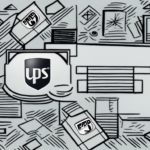Understanding UPS Express Freight International Bill Third Party C.O.D.
When shipping goods internationally, UPS is a reliable option that ensures your products are delivered quickly and safely to their intended destination. UPS offers a variety of services, including UPS Express Freight International, designed for businesses that require fast, secure, and time-definite shipments globally. In this article, we'll explore what UPS is, delve into the specifics of UPS Express Freight International, and discuss the advantages of utilizing Third Party C.O.D. in conjunction with UPS.
What is UPS?
UPS (United Parcel Service) is a global leader in logistics, offering a comprehensive range of shipping and supply chain management solutions to consumers and businesses worldwide. With over 230,000 employees spanning more than 220 countries and territories, UPS facilitates efficient package delivery, freight transportation, and innovative logistics solutions. In 2023, UPS reported revenues exceeding $100 billion, underscoring its significant role in the global supply chain landscape (Investopedia).
Beyond traditional shipping, UPS provides advanced technology solutions to help businesses optimize their supply chains. These solutions include inventory management systems, order fulfillment services, and transportation management platforms. UPS is also committed to sustainability, investing in alternative fuel vehicles, energy-efficient facilities, and sustainable packaging. The company's environmental initiatives aim to reduce its carbon footprint and promote eco-friendly practices within the logistics industry (UPS Sustainability).
What is UPS Express Freight International?
UPS Express Freight International is a premium shipping service that guarantees delivery for international shipments, making it ideal for businesses dealing with time-sensitive goods such as perishable items or products with strict deadlines. Depending on the destination, delivery times for UPS Express Freight International can range from 1 to 5 business days, with end-of-day delivery guarantees in most major markets (UPS Express Services).
A key advantage of UPS Express Freight International is its comprehensive customs clearance services. UPS handles all necessary paperwork and procedures required for your shipment to clear customs in the destination country, simplifying the process and saving businesses valuable time. This service alleviates the complexities associated with navigating diverse customs regulations across different countries, ensuring a smoother and more efficient shipping experience.
Additionally, UPS Express Freight International offers a money-back guarantee if your shipment is not delivered within the guaranteed timeframe. This assurance provides businesses with confidence in the reliability of their shipping partner and safeguards against potential delays (UPS Satisfaction Guarantee).
What is Third Party C.O.D.?
Third Party C.O.D. (Collect on Delivery) is a payment collection option for businesses shipping products internationally using UPS Express Freight International. This service allows businesses to authorize a third-party carrier to collect funds from customers on their behalf. Essentially, customers pay the third-party carrier upon delivery of the shipment, rather than paying the business directly.
With Third Party C.O.D., companies can mitigate risks associated with fraudulent purchases or non-payment, as the financial transaction is handled by an impartial third party. This approach is particularly beneficial for businesses that are new to international sales or lack the resources to manage complex payment collection processes internally (ShipScience on Third Party C.O.D.).
Additionally, Third Party C.O.D. enhances security and trust between the seller and the buyer by acting as a neutral intermediary in the transaction. The service streamlines the payment process, enabling businesses to focus on other critical aspects such as product development and customer service.
Why Use UPS Express Freight International?
Opting for UPS Express Freight International presents numerous advantages for businesses that need to ship goods swiftly, safely, and efficiently across global markets. One of the primary benefits is the assurance of timely delivery, critical for businesses adhering to specific deadlines or delivering perishable products. This reliability is supported by UPS's extensive global network, which includes over 1,900 facilities worldwide, facilitating seamless and efficient transportation of goods (UPS Global Network).
Compared to other shipping providers, UPS Express Freight International accommodates larger packages and heavier loads, allowing businesses to transport more substantial products without worrying about size or weight restrictions. This flexibility enables companies to expand their product offerings and reach diverse markets without logistical constraints.
Another significant advantage is the real-time shipment tracking feature offered by UPS. Businesses can monitor the progress of their shipments, receive updates on location and estimated delivery times, and proactively address any potential delays. This transparency enhances supply chain visibility, enabling better planning and efficient inventory management (UPS Tracking Services).
Moreover, UPS Express Freight International provides customizable shipping options tailored to the unique needs of each business. Whether it's temperature-controlled shipping for sensitive goods or specialized handling for fragile and hazardous materials, UPS offers solutions that align with various operational requirements and budget considerations. This adaptability ensures that businesses can optimize their shipping processes, reduce costs, and maintain the integrity of their products during transit.
The Benefits of Using Third Party C.O.D.
Integrating Third Party C.O.D. into your international shipping strategy offers several advantages, particularly in managing payments for UPS Express Freight International shipments. One of the foremost benefits is the mitigation of financial risks, such as non-payment or fraudulent transactions. By entrusting payment collection to a third-party carrier, businesses can ensure secure and reliable payment processes, thereby protecting their revenue streams.
Improved Cash Flow: Third Party C.O.D. facilitates timely payment collections, enhancing cash flow for businesses. By delegating the payment process to a specialist, companies can receive funds more predictably, allowing for better financial planning and stability.
Resource Efficiency: Managing international payments can be resource-intensive, requiring robust systems and dedicated personnel. Third Party C.O.D. alleviates this burden by handling all aspects of payment collection and processing, freeing up businesses to focus on core operations such as marketing, sales, and product development.
Enhanced Customer Trust: Offering Third Party C.O.D. as a payment option can bolster customer trust, particularly in markets where buyers may be wary of direct transactions with unfamiliar foreign companies. The involvement of a reputable third-party carrier as an intermediary provides a sense of security, encouraging customer engagement and repeat business.
Furthermore, integrating Third Party C.O.D. can expand market reach by enabling businesses to sell their products in regions where traditional payment methods may be less prevalent or reliable. This capability is essential for tapping into emerging markets and scaling operations on a global scale (ShipScience on C.O.D. Benefits).
How to Calculate Shipping Costs with UPS Express Freight International
Calculating shipping costs for UPS Express Freight International involves several factors, including the weight, dimensions, and destination of your package. To obtain an accurate estimate, businesses can utilize the UPS online shipping calculator, which provides immediate quotes based on the provided shipment details.
- Weight: The total weight of your package directly influences the shipping cost. Heavier parcels incur higher fees, so it is essential to accurately weigh your shipments.
- Dimensions: Larger packages may be subject to dimensional pricing, which considers the volume of the shipment in addition to its weight.
- Destination: The shipping cost varies based on the destination country's distance, customs regulations, and local transportation infrastructure.
- Service Type: UPS offers various service levels within Express Freight International, such as door-to-door or airport-to-airport delivery, each with different pricing structures.
- Additional Services: Optional services like customs clearance, insurance, and tracking can add to the overall shipping cost.
To ensure precise cost estimation, businesses should:
- Provide accurate package weight and dimensions.
- Select the appropriate service level based on delivery speed and cost considerations.
- Consider any additional services required for the shipment.
- Review potential discounts or negotiated rates that may apply based on shipping volume or company agreements.
Additionally, leveraging UPS's shipping discounts can further reduce costs, especially for businesses with high shipping volumes or long-term contracts.
Understanding the Billing Process for UPS Express Freight International
The billing process for UPS Express Freight International is designed to be straightforward and flexible, accommodating the diverse financial needs of businesses. Here's an overview of how the billing process works:
- Shipping Label Creation: When creating a shipping label through the UPS platform, businesses are prompted to enter billing information, including the company's name, address, and the recipient's shipping details.
- Invoice Generation: The shipping fee, along with any additional charges for services like customs clearance or insurance, is consolidated into a billing invoice. This invoice details all costs associated with the shipment.
- Payment Options: UPS offers various payment methods to accommodate different preferences and business needs:
- Credit Card: Major credit cards are accepted for immediate payment.
- Debit Card: Debit card payments are also supported, providing an alternative to credit transactions.
- Bank Transfer: For larger enterprises, bank transfers offer a secure and efficient payment method.
- Automatic Payments: Businesses with a UPS account can set up automatic payments, ensuring invoices are paid on time without manual intervention. This feature helps maintain seamless shipping operations and avoids potential delays due to missed payments.
- Receipt Confirmation: After payment is processed, UPS sends a receipt to confirm the transaction, providing a record for accounting and auditing purposes.
For businesses managing multiple shipments, UPS also offers UPS billing solutions that streamline the payment process, enabling centralized management of shipping expenses and simplified financial tracking.
If questions or concerns arise during the billing process, businesses can reach out to UPS customer service for assistance, ensuring that billing issues are resolved promptly and efficiently.
How to Set Up Third Party C.O.D. with UPS
Setting up Third Party C.O.D. with UPS Express Freight International involves a few straightforward steps to ensure seamless integration of payment collection into your shipping process:
- Visit the UPS Website: Navigate to the official UPS website and access the C.O.D. Services section.
- Fill Out the Request Form: Complete the online request form, providing essential details such as the desired collection amount and the third-party carrier you intend to use. Ensure that all information is accurate to avoid processing delays.
- Approval Process: Once submitted, UPS will review your request. Upon approval, you will receive instructions on how to establish your third-party collection account.
- Configure Shipping Labels: Integrate the relevant billing information into your shipping labels, indicating the third-party carrier responsible for collecting funds on your behalf.
- Training and Support: UPS may offer guidance or training on effectively using Third Party C.O.D., ensuring that your team is well-prepared to manage the service.
It's important to note that there may be additional fees associated with Third Party C.O.D. These fees can vary based on factors such as the chosen carrier and the volume of shipments. To ensure the service remains cost-effective for your business, carefully review the fee structure before finalizing your setup.
For detailed assistance, businesses can contact UPS customer service or consult with your UPS account manager, who can provide personalized support and answer specific questions regarding Third Party C.O.D. setup.
Best Practices for Using UPS Express Freight International and Third Party C.O.D.
To maximize the benefits of UPS Express Freight International and Third Party C.O.D., businesses should adhere to the following best practices:
- Accurate Documentation: Ensure that all shipping labels and billing invoices contain clear and precise information. Accurate documentation minimizes the risk of delays and billing discrepancies.
- Regular Communication: Maintain open lines of communication with both UPS and your customers. Provide timely updates on shipment status and payment collection to foster transparency and trust.
- Monitor Tracking Information: Utilize UPS's real-time tracking features to monitor the progress of your shipments. Proactive monitoring enables you to address any potential issues before they escalate.
- Manage Inventory Efficiently: Align your shipping schedules with inventory levels to ensure that products are available for timely dispatch, reducing the likelihood of shipping delays.
- Review and Optimize Shipping Processes: Regularly assess your shipping and payment collection procedures to identify opportunities for improvement, cost savings, and enhanced efficiency.
- Compliance with Regulations: Stay informed about the customs regulations and import/export laws of the destination countries to ensure compliance and smooth customs clearance.
- Leverage Technology: Utilize UPS's technological tools and integrations, such as transportation management systems, to streamline your shipping and billing operations.
By implementing these best practices, businesses can ensure a seamless experience when using UPS Express Freight International and Third Party C.O.D., leading to improved customer satisfaction and operational efficiency.
Common Issues and Solutions for Billing and C.O.D. with UPS Express Freight International
While using UPS Express Freight International and Third Party C.O.D. offers numerous benefits, businesses may encounter certain challenges. Understanding these common issues and their solutions is essential for maintaining smooth operations:
1. Payment Collection Conflicts
Issue: Customers may be hesitant or unwilling to use a third-party carrier for payment collection, leading to delays or refusals in payment.
Solution: Clearly communicate the benefits of Third Party C.O.D. to your customers, emphasizing the security and convenience it offers. Providing multiple payment options can also increase acceptance rates.
2. Billing Discrepancies
Issue: Inaccuracies in billing invoices, such as incorrect amounts or missing charges, can lead to confusion and delayed payments.
Solution: Implement a rigorous verification process for all billing documentation. Regularly audit invoices and work closely with UPS billing support to promptly address and rectify discrepancies.
3. Shipment Tracking Issues
Issue: Inconsistent or inaccurate tracking information can create uncertainty for both businesses and customers, potentially harming trust.
Solution: Utilize UPS's robust tracking system to monitor shipments in real-time. If tracking issues arise, contact UPS support immediately to resolve the problem and inform affected parties.
4. Delayed Customs Clearance
Issue: Unexpected delays in customs processing can disrupt delivery schedules and frustrate customers.
Solution: Ensure all required documentation is complete and accurate before shipping. Familiarize yourself with the customs regulations of the destination country and work with UPS's customs clearance experts to expedite the process.
5. Additional Fees and Hidden Costs
Issue: Unexpected fees, such as surcharges for additional services or customs duties, can inflate shipping costs beyond initial estimates.
Solution: Transparently communicate all potential costs to customers at the time of purchase. Use UPS's detailed billing breakdowns to track and manage additional charges effectively.
By proactively addressing these common issues, businesses can enhance their experience with UPS Express Freight International and Third Party C.O.D., ensuring reliable and efficient international shipping operations.
Tips for Saving Money on Shipping Costs with UPS Express Freight International
Shipping costs can significantly impact a business's bottom line. Here are several strategies to reduce expenses when using UPS Express Freight International:
- Consolidate Shipments: Combining multiple orders into a single shipment can lower overall shipping costs by reducing the number of packages and taking advantage of bulk shipping rates.
- Negotiate Shipping Rates: Businesses with high shipping volumes can negotiate lower rates with UPS by committing to a minimum number of shipments per year or leveraging long-term contracts.
- Optimize Packaging: Use efficient packing methods and materials to minimize package size and weight. Proper packaging not only reduces shipping costs but also minimizes the risk of damage during transit.
- Leverage Technology: Utilize UPS's shipping tools and software to find the most cost-effective shipping options. Automating the shipping process can also reduce administrative costs and errors.
- Plan Shipments Strategically: Schedule shipments during off-peak times to avoid premium pricing. Additionally, planning shipments in advance allows businesses to take advantage of more economical shipping options.
- Utilize UPS Discounts and Programs: Enroll in UPS discount programs or explore partnership opportunities that offer reduced rates for participating businesses.
- Monitor and Analyze Shipping Data: Regularly review shipping data to identify patterns and opportunities for cost savings. Analytics can highlight inefficiencies and inform better shipping decisions.
Implementing these tips can help businesses significantly reduce their shipping expenses while maintaining high standards of delivery and service quality.
Conclusion: Making the Most of UPS Express Freight International and Third Party C.O.D.
Leveraging UPS Express Freight International and Third Party C.O.D. can transform the way businesses handle international shipments, providing a streamlined, secure, and efficient process for both shipping and payment collection. By ensuring timely deliveries, enhancing payment security, and offering customizable shipping solutions, these services enable businesses to expand their global reach with confidence.
To maximize the advantages of these services, businesses should adopt best practices, stay informed about potential challenges, and implement cost-saving strategies. By doing so, companies can mitigate risks, enhance customer satisfaction, and drive growth in the competitive global marketplace.
As global trade continues to evolve, partnering with a reliable logistics provider like UPS and utilizing services such as Express Freight International and Third Party C.O.D. will be instrumental in achieving sustained success and operational excellence.




















